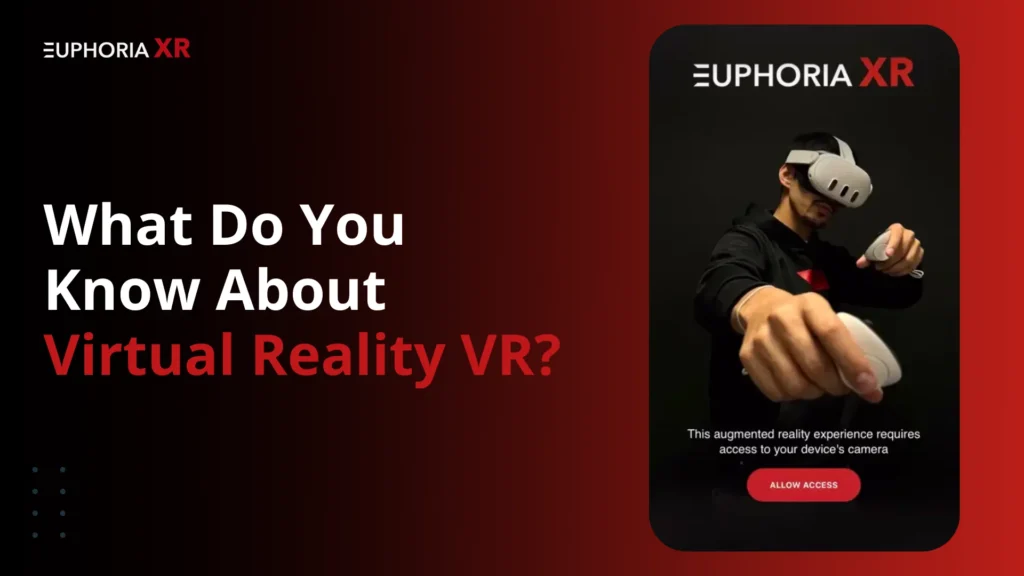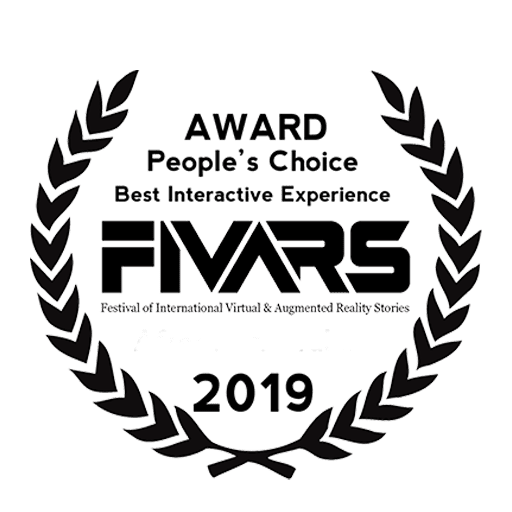Our connection to everything around us is experiencing a remarkable shift in today’s linked world due to the merging of reality and the virtual world. Virtual reality (VR) and augmented reality (AR) have become the main drivers of this paradigm change, transforming our experiences from advanced learning opportunities to fully immersive gaming adventures. These technologies offer more than just fun; they have opened doors to a world of boundless possibilities and new directions for research and adventure. AR/VR developers are leading this digital revolution. They are the creative minds creating the environments of future realities.
EuphoriaXR, a prominent AR/VR and Metaverse Development Company in the United States, displays this unique and imaginative mindset. With its constant commitment to expanding the possibilities of immersive experiences, EuphoriaXR has made a name for itself as a pioneer in AR/VR development. EuphoriaXR is the perfect place to consider if you’re looking for an expert AR/VR developer.
Let’s now tour the fascinating AR/VR development world, learning about the jobs, daily tasks, and fundamental abilities needed to succeed in this fast-paced industry.
What is an AR/VR Developer?
A developer specializing in Augmented reality (AR) and virtual reality (VR) develops apps and experiences that use these technologies. These developers are extremely knowledgeable about immersive technology frameworks, user interface design, and computer graphics. They create interactive simulations, games, training materials, visualization tools, and other immersive experiences using AR/VR development platforms like Unity or Unreal Engine and programming languages like C#, C++, or JavaScript.
AR/VR developers collaborate with designers, artists, and UX/UI professionals to envision, create, and develop immersive content that captivates users and produces memorable experiences. They use technologies like gesture detection, real-time interaction, spatial audio, 3D models, and animations to build immersive environments that fuse the virtual and real worlds.
Hire Experienced AR Developers for Custom Solution
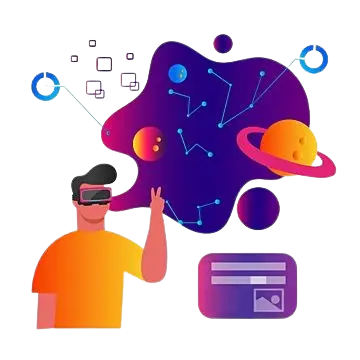
What is the Role of an AR/VR Developer?
An AR/VR developer’s job description includes various duties for achieving immersive experiences, from conception to implementation. These experts are crucial in creating compelling AR and VR applications that enthrall users and spur innovation in various industries. The following are the primary roles and responsibilities usually involved in the work of an AR/VR developer:
Application Creation:
Using AR/VR technologies, developers are responsible for creating simulations, applications, and experiences. This entails developing code, implementing features, and maximizing performance to provide engaging and interactive information.
Integration and Testing:
Integrating different elements into AR/VR apps, such as external APIs, input devices, audio, and 3D assets, is an essential part of the job. AR/VR developers undergo thorough testing to verify functionality, performance, and compatibility across different gadgets and platforms.
System Selection:
Depending on the project’s needs and technological factors, AR/VR developers must select the right development platforms, tools, and SDKs (Software Development Skills). This may require working with platforms like Unity, Unreal Engine, or unique frameworks.
Performance Improvement:
Providing smooth and immersive experiences requires that AR/VR applications operate at peak efficiency regarding frame rate, performance, and resource usage. This could mean lowering latency, streamlining rendering pipelines, and implementing effective algorithms.
User Experience (UX) Design:
The design of user interfaces and interactions that are both simple and engaging is the responsibility of AR/VR developers. This work is done to improve user immersion and usability in virtual settings.
Design and Prototyping:
AR/VR developers work closely with designers and stakeholders to conceptualize AR/VR experiences translated into wireframes and prototypes. This entails producing visual effects, animations, 3D models, and user interface elements.
Investigation and imaginative thinking:
Keeping up with the most recent developments in AR/VR development, including trends, technology, and best practices, is essential to promoting creativity. An AR/VR programmer explores new frontiers in immersive storytelling and user experiences by experimenting with the latest tools and methodologies and developing hardware.
Documentation and Administration:
Documenting technical specifications, design choices, and code facilitates the sharing of information and team collaboration. Ensuring the life and relevance of AR/VR applications post-launch requires regular updates, maintenance, and support.
How To Become an AR/VR Developer?
To become an AR/VR developer, one must possess a strong interest in immersive technology, practical experience, and training. Here is a comprehensive guidance for starting your career as an AR/VR developer:
Create a Strong Basis in Programming:
Start by studying programming languages like C#, C++, or JavaScript frequently used in AR/VR development.
Learn about fundamentals, including data structures, algorithms, and object-oriented programming.
Study 3D Animation and Modeling:
Develop your 3D modeling, texturing, and animation abilities with Blender, Maya, or 3ds Max programs. To develop convincing virtual settings and characters, it is important to understand the fundamentals of geometry, lighting, and shading.
Examine these platforms and tools for AR/VR development:
Learn how to use well-known AR/VR development platforms like Unreal Engine or Unity3D.
Acquire proficiency in utilizing AR/VR development-specific development tools, software development kits (SDKs), and plugins.
Develop Your Portfolio and Projects:
Develop your own AR/VR projects to put your expertise into practice.
Make a portfolio that includes screenshots, videos, and explanations of your work that highlight your skills.
Participate in Competitions:
Participate in game jams and competitions for AR/VR to meet professionals in the field and obtain practical experience.
Work with others to demonstrate your abilities and gain knowledge from their experiences.
Look for Appropriate Training and Education:
To expand your knowledge and qualifications, consider getting a degree or certification in computer science, game development, or a similar industry.
Enroll in AR/VR development programs, attend seminars, and take online courses to familiarize yourself with the latest technology and best practices.
Join Networks and Communities for AR/VR:
Participate in social media groups, developer networks, and online AR/VR development forums.
Engage in dialogues, ask inquiries, and share your experiences to broaden your network and get knowledge from others.
Seek For Internships:
Look for entry-level jobs or internships at businesses or startups developing AR and VR.
Get hands-on experience by engaging with seasoned professionals on real-world projects.
Constantly Recognize and Adjust:
Stay updated with technologies and developments in AR/VR development.
Try out new hardware, methods, and tools to improve your abilities and maintain your edge in the industry.
Display Your Expertise and Connectivity:
Continue to add fresh accomplishments and projects to your portfolio.
Attend meetups, conferences, and networking events related to AR/VR to establish connections with people in the field and possible employers.
Your future as an AR/VR developer can be bright. By taking the time to master these stages and keep improving your skills, you can expect to contribute to the development of immersive technologies and digital experiences. We have an Expert AR/VR developer eager to execute your ideas. They have the expertise, abilities, and proficiency to turn your ideas into fully immersive virtual worlds.
What are the Challenges an AR/VR programmer faces?
Some particular difficulties faced by AR/VR developers are:
Developing AR/VR is challenging, with hardware constraints, obstacles to user experience design, and technical complexity.
Technical difficulties could include minimizing motion sickness in virtual reality experiences, maintaining platform compatibility, and optimizing performance for various devices.
Hardware constraints, such as those related to processing power and display resolution, can impact the quality and immersiveness of AR/VR applications.
Designing intuitive user interfaces and interactions in virtual worlds presents additional difficulties since developers must consider user comfort and spatial awareness.
Possibilities for industry innovation and development:
Despite these obstacles, there are a lot of chances for innovation and expansion in AR/VR development.
The expanding availability of low-cost hardware, improvements in software development tools, and the growing desire for immersive experiences encourage innovation.
With the potential to create new markets and revenue streams, AR/VR technology can completely transform several industries, including gaming, healthcare, education, and enterprise.
There are increasing chances to create engaging AR/VR content and applications as the technology develops and becomes more widely available.
Conclusion:
Being an AR/VR developer is an exciting and dynamic journey into innovation and virtual immersion. Future interactive entertainment, education, and business are greatly influenced by AR/VR developers, who do everything from imagining compelling experiences to grasping technological nuances. Aspiring AR/VR developers can pursue a fulfilling career that blurs the borders between virtuality and reality while transforming how we perceive and interact with the world, sharpening their talents, embracing constant learning, and pushing the bounds of creativity.
EuphoriaXR is the best option for selecting your business’s ideal AR/VR development company.
Our team of expert AR/VR programmers is dedicated to realizing your vision, and we have a proven track record of creating outstanding immersive experiences. EuphoriaXR has the knowledge, creativity, and commitment to surpass your goals, whether you’re trying to produce ground-breaking entertainment content, transform training and education, or improve consumer engagement. Get in touch with us right now to discover how we can help your AR/VR imaginations achieve a record-breaking outcome.
Frequently Asked Questions FAQs:
What is AR/VR development?
Augmented reality (AR) and virtual reality (VR) development is the process of utilizing these technologies to create immersive experiences. Developers use programming languages, 3D modeling, and other tools to create interactive content that can take users to fully virtual locations or overlay virtual aspects of the actual world.
What programming language should I learn for AR VR?
JavaScript is the preferred programming language for contemporary web-based augmented and virtual reality apps.
What skills are required to become an AR/VR developer?
Expertise in programming languages like C#, C++, or JavaScript, 3D modeling and animation skills, acquaintance with AR/VR development platforms like Unity or Unreal Engine, problem-solving aptitude, and effective communication and teamwork are all necessary for AR/VR creation.

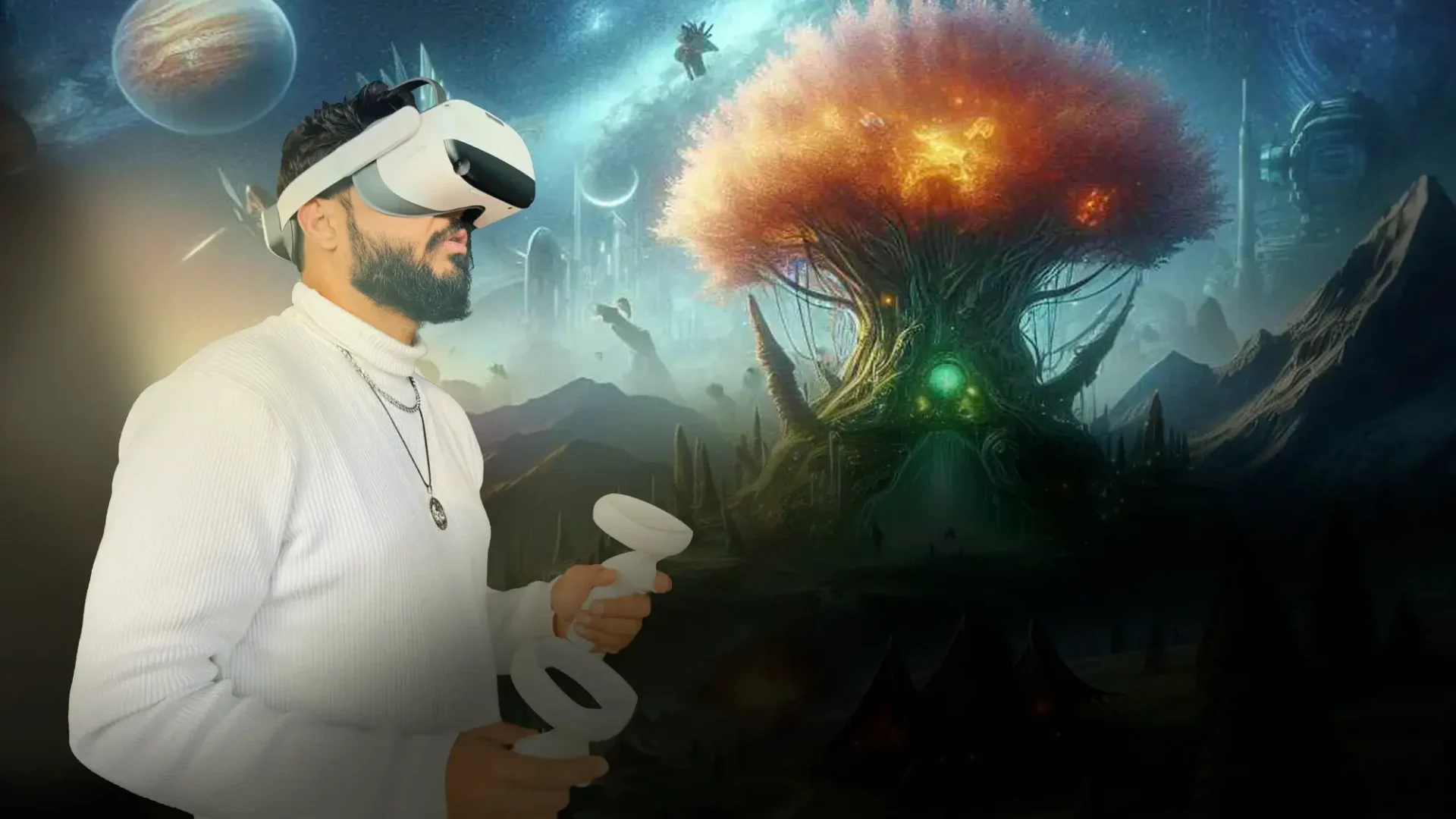


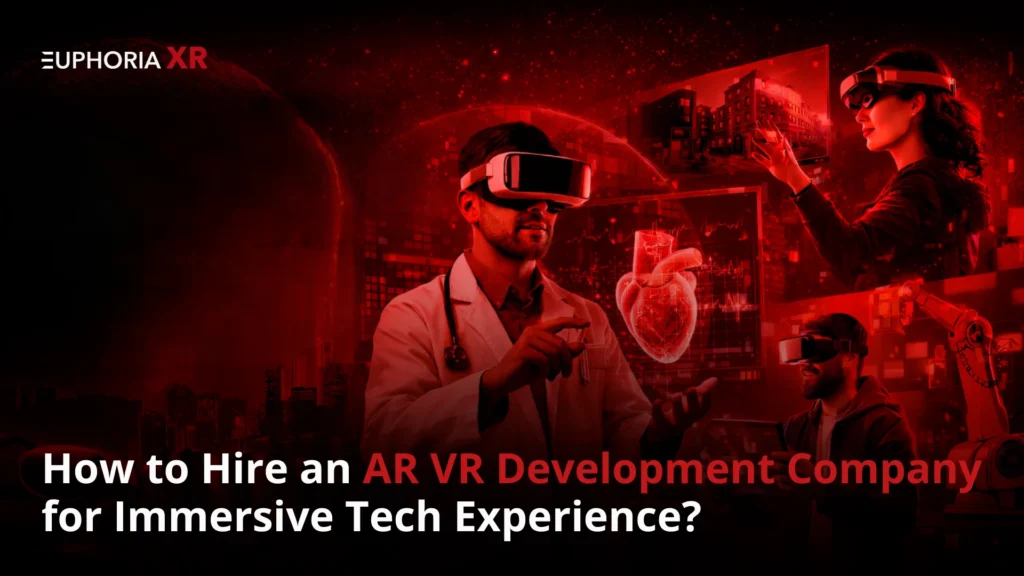
![Top 50 (CTA) Call to Action Synonyms That Drive ROI & Conversions [+ Examples] - Euphoria XR](https://euphoriaxr.com/wp-content/uploads/2026/02/Top-50-CTA-Call-to-Action-Synonyms-That-Drive-ROI-Conversions-Examples-Euphoria-XR-1024x576.webp)
